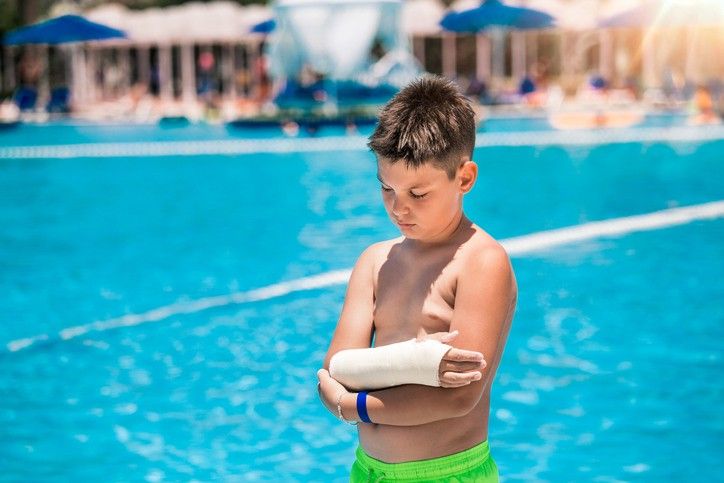Liability for swimming pool injuries in Georgia can involve several parties, depending on the circumstances of the incident. Here, our Atlanta personal injury attorneys at Ashby Thelen Lowry outline the primary parties who might be held liable and the legal principles that apply to a claim’s circumstances.

Who Can Be Held Liable for Georgia Swimming Pool Injuries?
Georgia’s premises liability laws allow injured parties to hold property owners, managers, manufacturers, and contractors liable for swimming pool incidents under certain conditions.
That includes those who own:
- Private Pools: Homeowners with private swimming pools have a duty to maintain a safe environment for guests and visitors. This includes ensuring the pool is properly maintained and secured and that any hazards are addressed.
- Commercial Pools: Owners of public or commercial swimming pools, such as those in hotels, apartment complexes, and community centers, have a higher duty of care. They must comply with local health and safety regulations, including proper fencing, signage, lifeguard services, and regular maintenance.
Property managers and operators may be liable for swimming pool injuries, including those involving:
- Maintenance and Safety: Property managers or operators who oversee the pool’s day-to-day operations may be liable if they fail to maintain the pool safely, such as neglecting regular cleaning, chemical balancing, and equipment checks.
- Supervision: Ensuring proper supervision, including hiring qualified lifeguards and providing adequate training, is crucial for commercial pools.
Manufacturers and installers may be liable for swimming pool injuries, including those involving:
- Defective Equipment: If a pool injury results from defective equipment, such as faulty pool drains, slides, or diving boards, the manufacturer or installer might be liable under product liability laws.
- Installation Errors: Contractors or companies responsible for improperly installing pool equipment or safety features can also be held accountable.
Contractors and maintenance companies may be liable for swimming pool injuries, including those involving:
- Negligent Repairs: Companies or individuals hired to repair or maintain the pool could be liable if their negligence in performing their duties leads to unsafe conditions.
- Failure to Warn: If maintenance workers are aware of potential hazards and fail to warn the property owner or take steps to rectify the situation, they might be held responsible.
What are the Legal Principles in Georgia Swimming Pool Injury Cases?
Georgia’s premises liability statute allows individuals injured on someone else’s property to seek compensation if the property owner’s negligence contributed to the injury. The law mandates that property owners exercise reasonable care in maintaining their premises and addressing potential hazards to prevent harm to lawful visitors, such as guests, customers, or tenants. The statute distinguishes between different types of visitors—invitees, licensees, and trespassers—each owed varying levels of duty.
- Invitees: Individuals invited to use the pool for business purposes, such as hotel guests or paying swim club members. Property owners owe the highest duty of care to invitees, including regular inspections and prompt repairs of any hazards.
- Licensees: Social guests or others can use the pool without a commercial relationship. Property owners must warn licensees of unknown dangers.
- Trespassers: Trespassers are people who enter the pool area without permission. The duty of care owed to trespassers is limited, but property owners must not willfully or recklessly cause harm. The attractive nuisance doctrine may apply to child trespassers, requiring property owners to secure the pool to prevent incidents.
How Can I Prove Negligence Was a Factor in a Swimming Pool Incident with Injuries in Georgia?
Liability for swimming pool injuries in Georgia can involve property owners, managers, maintenance companies, equipment manufacturers, and other parties. Understanding the legal principles of premises liability, negligence, and product liability is crucial in determining responsibility.
That begins with proving the following four factors are true for your personal injury claim:
- Duty of Care: Establishing that the property owner or responsible party owed a duty of care to the injured person.
- Breach of Duty: Demonstrating that the duty of care was breached by failing to maintain a safe pool environment or warn of known hazards.
- Causation: Proving that the breach of duty directly caused the injury.
- Damages: You suffered actual damages, such as medical expenses, lost wages, and pain and suffering.
If you or a loved one has been injured in a swimming pool incident, contact our skilled Atlanta personal injury lawyers and support team at Ashby Thelen Lowry at (404) 777-7771 to schedule a free consultation. This initial step will ensure your rights are protected and enable you to make informed decisions about the direction of your claim. We can help you navigate the legal process and seek the compensation you deserve.
